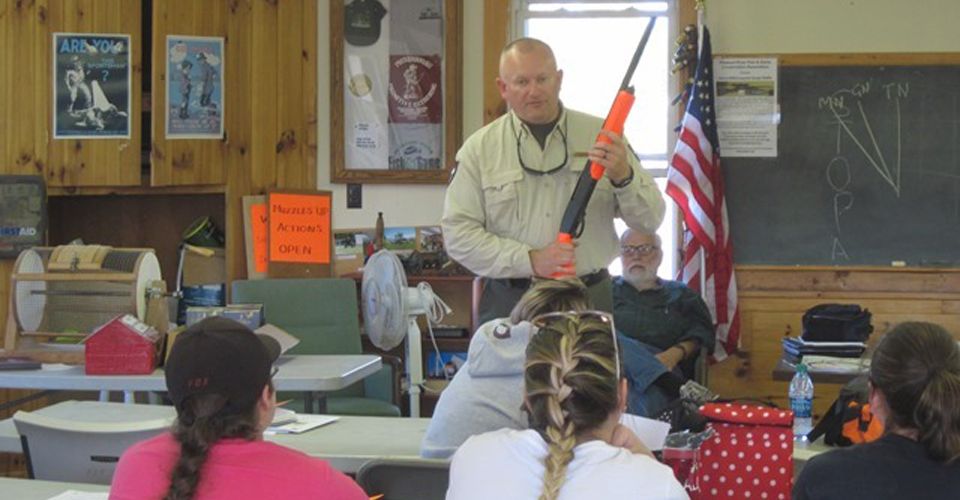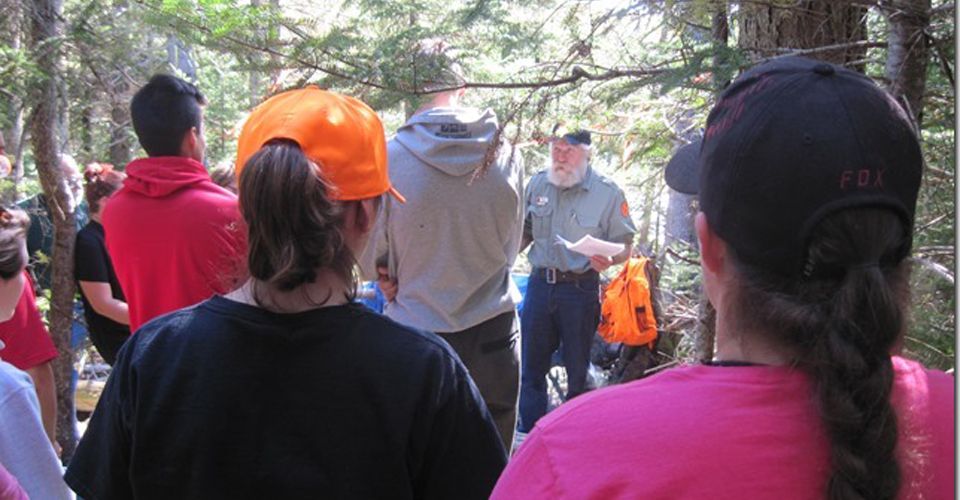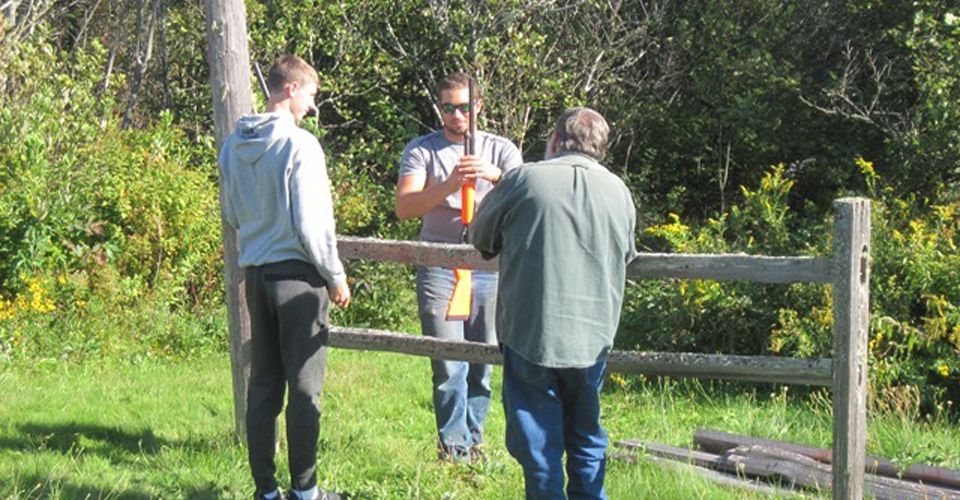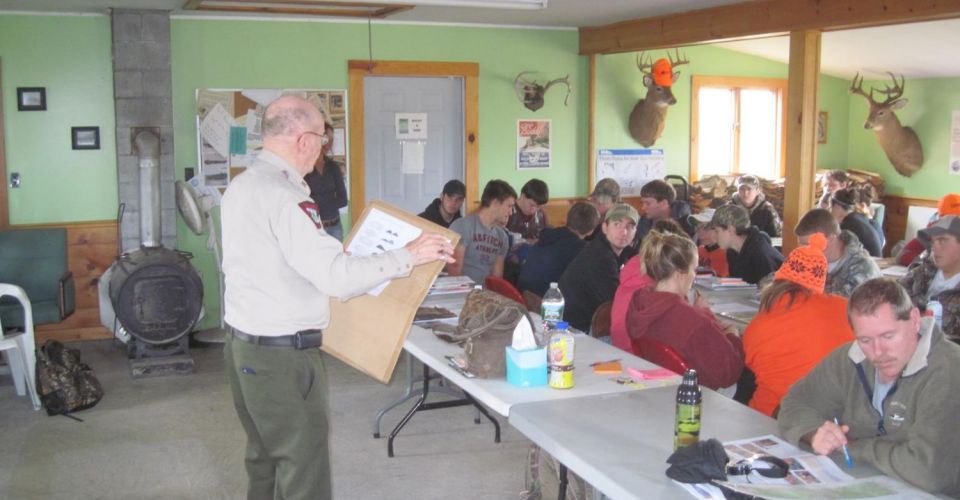Hunter Safety Course
Upcoming Course Dates
DAY ONE: September 17, 2020 , 6 PM-9 PM
DAY TWO: September 21,2020, 9 AM-4 PM
To register for a course, contact Larry Balchen at 207-497-5621.
As part of our strong commitment to conservation, ethical sportsmanship, and the future of outdoor recreation, the Pleasant River Fish and Game Conservation Association (PRFGCA) in cooperation with the Maine Department of Inland Fisheries and Wildlife hosts two hunter safety classes each year, one in the late spring or early summer, the other in the autumn. For specific dates, please refer to our “Upcoming Events” section. These courses are taught by members of the organization on a volunteer basis. We urge that when you take this course that you do so not just because you are fulfilling a requirement, but in the spirit of starting a long journey towards becoming a good hunter.
PRFGCA has been fortunate in providing the area hunters with a Maine Hunter Safety Course for several decades. Hundreds of students have taken this course from our dedicated instructors and have become responsible outdoor hunters.
Who is required to take a hunter safety course?
According to state law: “Anyone 10 years of age and over must obtain a license to hunt wild birds or wild animals.” Further, “Applicants for an adult hunting license must show proof of having previously held an adult license to hunt with firearms in any year beginning with 1976 or successful completion of an approved hunter safety course from this or any other state.” In addition, “Convicted felons who have not been issued a permit to carry a firearm cannot purchase or possess a firearms or crossbow hunting license in Maine.”
Registration:
Classes are open to anyone aged fourteen and older who legally qualifies to hunt with a firearm in the state of Maine. Students under the age of eighteen must submit a signed parental consent form, this form will be available at our first class. Pre-registration by telephone or e-mail is mandatory. Space is limited, pre-registration will close at such time as all available slots are filled. There is no fee for attending the class, although donations to PRGCA. welcome.
Attendance:
Each course consists of one evening from 6 PM-9 PM (usually a Wednesday or a Thursday) , and one Saturday from 9 AM-4 PM. Students are expected to arrive at least ten minutes early, as instruction begins promptly at the times shown. Attendance of all three classes is mandatory. Absence will cause the student to be dropped from the course. For the parents or guardians of younger students who are depending on a ride to and from the class, please see to it that you arrive on time to pick up your student at the end of each class.
Behavior:
Hunter safety is a serious subject, and we have a limited amount of time to cover many important subjects. Students are expected to behave appropriately. Horseplay, talking during instruction, listening to music, and sleeping will not be tolerated. All cell phones will be turned off prior to the beginning of instruction, there will be no text messaging. Any student that persists in any disruptive behavior will be dropped from the course. Please remember that your instructors are volunteers — treat them with the respect they deserve and also be considerate of your fellow students.
What to bring:
Aside from a good attitude and a willingness to learn, bring a note pad and pencil. You may bring a refreshment or snack for the break. On Saturday, the students are asked to bring a bag lunch. Be sure to wear or bring clothing appropriate to the weather for the Saturday class, as there will be outdoor activities that the students are required to participate in, rain or shine.
A brief overview of the course and its subjects:
Introduction– A brief history of hunter safety, including how it and the Dept. of Inland Fisheries and Wildlife are funded. You will at this time be issued all necessary printed materials that go with the course. Some of these you will be required to bring to every class with you, these will be specified during this phase of instruction.
Map and Compass– Classroom instruction on the parts and function of the base plate compass, map reading, and plotting a course with map and compass. Students will also use compasses to complete an elementary land navigation course through the woods and fields of the club grounds.
First Aid– A basic introduction to emergency treatment of common outdoor injuries. Strong emphasis on the prevention and treatment of hypothermia. A short film on hypothermia will be shown.
Outdoor Survival– Instruction in how to safely spend a night in the outdoors due to an emergency or should you not be able to find your way. How to make finding you easier for rescuers. Fire making, signaling, and shelter. In addition, survival kits will be discussed, and students will be required to assemble their own survival kit, which will be inspected for completeness during the Saturday class. A film on wilderness safety will be shown.
Hunter Ethics, Conservation, and Landowner Relations– Stresses the rules of fair hunting and the importance of considering the rights and feelings of others when afield. Wild game as a renewable resource, and the management of that resource. Emphasis is also placed on the importance of proper game identification and the ethical considerations regarding the killing of game. The rights of landowners and your responsibilities as a hunter when on other’s land.
Safe Handling, Storage, and Transportation of Firearms– How to safely handle firearms, including what to do when a firearm is handed to you, how to safely carry, cross obstacles, case, transport, and store firearms. The film “Shoot- don’t shoot” will be shown.
Identification of Ammunition– How to identify different types, calibers, and gauges of shotgun shells, rimfire, and centerfire ammunition. The different types of projectiles and their effective ranges will also be discussed.
Shotgun Handling and Nomenclature– Descriptions of the different types of the most commonly encountered shotgun actions and their function. The various parts of a shotgun will be discussed.
Rifle Handling and Nomenclature– Descriptions of the different types of the most commonly encountered rifle actions and their function. Description of the various parts of a rifle, including the different types of sights commonly encountered and their uses.
Maine State Hunting Laws and Rules– In this segment, a Maine State Game Warden will instruct the class regarding rules and laws pertaining to hunting. The warden will also answer any questions the students might have on the subject.
Test Review– There will be a review of all topics covered prior to the fifty question test that each student is required to pass at the end of the course.
The test– Finally, the test will be given, scored, and certificates of completion awarded to those who successfully pass the course.
For More Information:
Contact person is Larry Balchen at 207-497-5621
Email: huntersafety@prfgca.org



